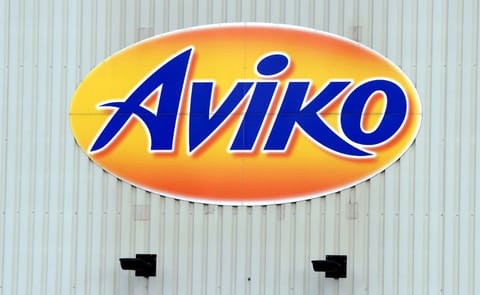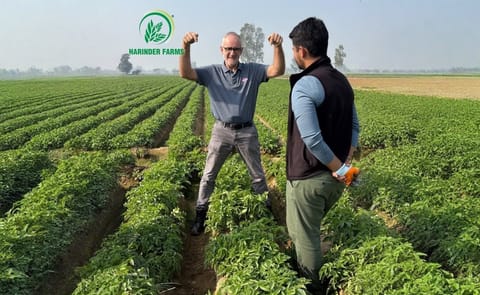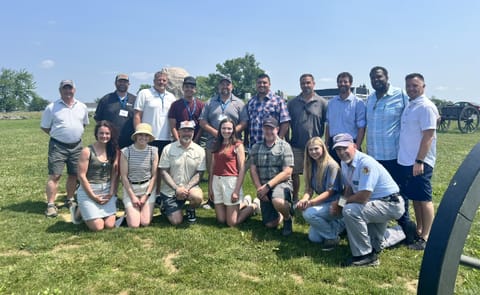At the top of a hill, a tractor with a 17-foot wide planter plugs seed potatoes into the sandy ground at the Ice Harbor Hilltop Farm east of Burbank. (Courtesy: Northwest News Network)
The legacy of Frank Tiegs, a Northwest Ag titan who recently died at 66

In the heartland of the Columbia Basin, amidst the sprawling landscape of Ice Harbor Hilltop Farm, Keith Tiegs, eldest son of the late business tycoon Frank Tiegs, navigates his way through the vast expanse in his white Chevy Silverado pickup.
The farm, stretching over 10,000 acres. Frank, Keith’s father, built and operated his empire until very recently, when died of cardiac arrest in early February.

Keith Tiegs, 42, is now running the family’s empire that was built by his father across much of North America, including the Northwest and Canada. (Courtesy: Northwest News Network)
First-name billionaire
Well, east of the Cascades – in Washington, Oregon and Idaho farm country – one first name means a lot, too: Frank! Frank and his family own a good-sized chunk of the Columbia Basin and many of the food processing plants that feed much of the nation and world.
You’ve likely tasted one of his products without knowing it: Pringles chips, fast-food french fries, dehydrated onions and Jamba At Home Smoothies frozen fruit. Frank also had a propensity to sue and was a fierce businessman. His celebration of life at 3 p.m. March 29 at the Three Rivers Convention Center in Kennewick is expected to draw hundreds from across the nation.
Basin spring
Back on the Ice Harbor Hilltop Farm, the Tiegs’ family potato planting is the herald of spring in the Columbia Basin. The family farms so much ground that to plant it all, they often plant early so as not to finish too late into the summer. This year, the family intends to plant north of 30,000 acres of potatoes in Washington, Oregon and Idaho. Most growers in the Northwest grow near 1,500 acres of potatoes, industry experts say.
That’s so much potato seed that the family brings it in from Idaho, Montana and Alberta, Canada, by the hundreds of truck loads. They also bring spud seed in by rail from Wisconsin, the East Coast and even Prince Edward Island.
Keith Tiegs:
"I don’t know. I’ve always heard that we’re among the top five potato growers in the USA."
Keith says the family farms about 140,000 acres over the Northwest. Put all together, that's an area larger than two Seattles.
Frank was born in 1957 and raised in Melba, Idaho. He moved to Pasco, Washington, as a young man and worked to farm his first ground. From beans, literally, he kept building his empire until he owned:
- A drill bit factory in called RMT in Ronan, Montana;
- A potato and onion fresh pack facility in Pasco, Washington, called Baker Produce;
- An apple fresh-pack facility in Zillah also called Baker Produce;
- A vegetable processing facility in Pasco called Pasco Processing;
- A flash-freezing facility for blueberries and onions in Pasco called Freeze Pack;
- Vegetable processing facilities in Moses Lake, Winchester and Chehalis in Washington and in Albany, Oregon, all under the name National Frozen Foods;
- Quincy Foods vegetable processing plant in Quincy;
- Frozen fruits and vegetable facility called NORPAC in Brooks, Oregon;
- A plant in Lynden that freezes berries, plus an 800-acre raspberry farm, both called Rader Farms;
- Potato dehydration plants in Warden, Washington, and Boardman, Oregon, and in Heyburn and Sugar City, Idaho, and New Brunswick, Canada;
- There’s a pepper and onion processing plant in Fruitland, Idaho, called Dickenson Foods;
- A vegetable processing facility in Walkersville, Michigan, called Arbre Farms;
- The family farms more than 140,000 acres across the Northwest; and
- Total impact: The Tiegs family owns nearly 20 food processing plants and more than 30 companies. They employ more than 5,000 full-time positions and more seasonally, across the nation and Canada.

Frank Tiegs, right, with 'The Snake' racer, Don Prudhomme, at the 2023 NHRA Northwest nationals in Seattle.
More muscle
Tiegs also owned more than 100 classic cars – mostly of the muscle variety from the 1960s and ‘70s. He also sponsored two national top fuel drag race car crews working for John Force. In addition, Frank was the race sponsor for the Seattle National Hot Rod Association races in Seattle for two years. At Frank’s low-key corporate office in Pasco, Keith takes me into the back, through a nondescript, drab shop door.
The lights are already on and they reflect brilliantly off the shiny Skittles-colored sleek bodies of dozens of expensive one-of-a-kind cars.
Keith Tiegs:
"This is a Dodge Demon. This is a Pontiac GTO. This is a Shelby Don Prudhomme Super Snake, kind of a rare, one-off car. This is a convertible COPO Camaro. This is a Mustang Shelby GT500. This is a Mercury Comet 202, fairly rare car."
Despite his wealth and power in agriculture, Frank was famously media shy. He rejected most interview requests, repeatedly. He turned down awards and notoriety. He would donate to many causes but demand his name be left off of most plaques.
I don’t think he didn’t care. I think he did care, but he just was, again, very private and didn’t want anyone to know his business." Frank also was known to be sometimes gruff with those outside his family and a ruthless businessman. He’d make fast cash deals to secure rents, properties or businesses. Frank’s sharp mind and memory was well-known. Dale Lathim is a leader in the potato industry in Washington and Oregon.
Dale Lathim:
"I was actually riding with Frank in his pickup. He was taking me around showing me his fields and things, and he got a call from his fertilizer fieldman, and he told the fieldman."
"We need to go over what we’re going to put on each field. He rattled off circle numbers and what the soil samples came back and how much pounds of nutrient he put on each field. He did that on like 20 to 30 fields, without ever looking at a piece of paper while he was driving. It was just in his mind."
Handshake
Frank was also controversial, for example, being on the wrong side of government regulators. Fire destroyed one of his potato plants a few years ago. Moreover, he had a propensity to start lawsuits, or be in them, with anyone who threatened his businesses. In one 2017 case, J.R. Simplot Co. filed a temporary restraining order and lawsuit against Frank after a dispute over a partnership went sour over several food processing plants across the Northwest. Frank prevailed.
In a 1998 lawsuit, Frank went up against another farmer over a piece of ground near Wallula. Frank, and two other farm operations, claimed there was chlorine contamination in the fields curling the leaves of the potato plants they had and not adequate quality water like they’d been promised. Frank prevailed on that one too. Frank was also well-known for his famous handshake deals or property deals scratched out on small hunks of paper.
Keith Tiegs:
"This day and age there’s not a lot of times you can do agreements with handshakes. That’s pretty well how he did all his deals. He never liked having anything in writing because he just felt if he couldn’t handshake on it and your word wasn’t your word, then what good was pen and paper?"
Gary Roth, the executive director of the Oregon Potato Commission:
"Frank was a man of significant import in the industry and he leaves a very big footprint. I’ve had many growers tell me that if Frank Tiegs gave you his word, he was good for it."
Frank’s family remembers him as always working but also devoted. The businessman cooked homespun breakfasts of pancakes, bacon and eggs on the weekends for his family. Keith Tiegs:
"I think the people that knew my dad extremely well and created a friendship with him, saw the joking, more lighthearted side of him. People that dealt with him in business saw just the business side of him."

Frank Tiegs' longtime friend, Brian Drouhard, and his young aussie dog, Annie.
The crash
In March 2014, Frank failed to yield in a car crash that nearly ended his life. Keith says his father got hit by an irrigation employee off of Phend Road north of Pasco.
Keith Tiegs:
"Somehow it had spun him around. Obviously he must have been knocked out and ended up driving through an alfalfa field and basically made a big swoop and crashed into a big dirt embankment right over a big canal that thankfully didn’t have any water in it at that time. Based on the impact, his foot must have been stuck to the accelerator."
Frank broke his back, 10 ribs, his wrist and hit his head badly on the windshield. The crash left him paralyzed from the chest down. He was hospitalized in the ICU at Harborview Medical Center in Seattle.
After he recovered for about a year, Frank worked with a physical therapist several days a week for the rest of his life, Keith says. He had a special Chevy pickup outfitted with hand controls so he could drive around and direct traffic on his farms.
Brian Drouhard is a fellow farmer from near Othello, who was friends with Frank for more than 40 years. Drouhard says he’d ride truck with Frank nearly every Saturday, from daybreak to dark. Sucking on bags full of what they called "hot balls," or cinnamon candy, and streaming National Hot Rod Association drag races on an iPad, while they’d look over fields and develop a plan for fertilizers, pesticides and water, and equipment, planting and harvesting schedules, for each coming week.
After his big crash, Frank couldn’t wade into the growing fields any more to take soil samples or look for pests, so Drouhard says he would do the legwork for Frank.
Brian Drouhard:
"I guess I let him be my brains, and I got to be his feet."

The Tiegs family has so much potato ground to get planted – more than 30,000 acres – they have start early in the season, often one of the first in the Columbia Basin to finish planting by early summer. (Courtesy: Northwest News Network)
Legacy
Frank’s agricultural products, such as bags of potatoes and onions, can be found at grocery stores. His vegetables are at Walmart under the label Great Value. He also sold frozen stir fry kits, potatoes O’Brien and frozen bags of mixed fruit for smoothies. Frank’s tool factory churns out drill bits and driving accessories for numerous customers, including Home Depot, Lowes, Boeing, and Lockheed Martin.
Frank was 66 when he died. He is survived by his wife, Janet, daughter Melissa, and sons Keith, Douglas and Jordan. Six grandchildren also survive him. Keith – 42 – is now at the helm of this ag-heavy, nationwide empire. He says he’s getting less sleep lately. Keith says he knows the customers and industry players and he knows the business well enough.
Keith Tiegs:
"I was taught by the best – my father."










